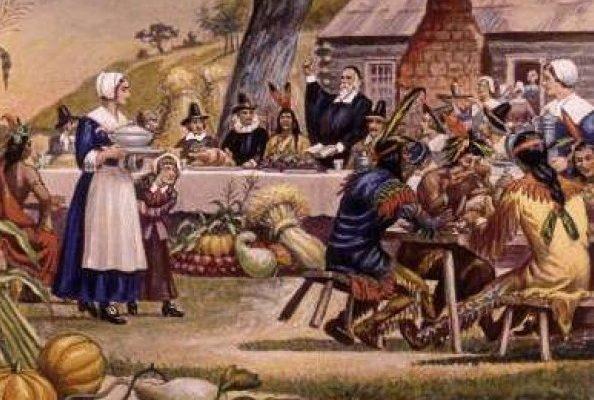“And so the power of the Lord’s word enters the soul and enlivens the heart and makes us rejoice in the Lord. This is the most loving thanksgiving in God’s sight.”
Both the United States and Canada celebrate the agricultural harvest and other blessings of our life with an annual feast day in the fall. These feast days are not only festive celebrations, but also a time to recall our responsibilities as stewards.
Although regional variations of dates and observances arose in later years, George Washington declared the first national day of Thanksgiving in 1789. In 1939 Congress fixed the date of Thanksgiving in the United States as the fourth Thursday in November. Canada celebrated its first national Thanksgiving in 1879, and now observes the day on the second Monday of each October.
Thanksgiving was the first holiday celebrated by the Puritan settlers of Massachusetts. The winter of 1620 had devastated the Puritans’ colony with famine and disease. Help from the Native Americans (a Native viewpoint from 2000) and a good growing season resulted in a generous harvest in 1621, an event the colony celebrated by proclaiming a public day of thanksgiving. The three-day celebration, held after the harvest, combined two aspects of similar celebrations from England and Europe, a harvest festival and a public thanksgiving for a specific occasion of deliverance.
Harvest festivals, of course, are found in agricultural communities across the globe and throughout history. Three Jewish festivals — Passover, Pentecostand Tabernacles — had connections to agricultural events. The first occurred at the time of new births in the animal flocks; the second at the harvest of grain; and the third at the time of new wine.
Many different harvest festivals were celebrated by the medieval Church. One such day was Lammas Day in England, which commemorated the harvest of grain with church services and feasting. Though the Puritan settlers did not retain Lammas Day or similar feasts, their celebration of 1621 did retain such harvest festival traditions as prayer, feasting and games. Even our contemporary celebration of Thanksgiving includes these traditions.
Thanksgiving belongs to prayer. Thanksgiving is a true inward acknowledgement, we applying ourselves with great reverence and loving fear with all our powers to the work that God moved us to, rejoicing and giving thanks inwardly. And so the power of the Lord’s word enters the soul and enlivens the heart and makes us rejoice in the Lord. This is the most loving thanksgiving in God’s sight. -Julian of Norwich
The second aspect of Thanksgiving — gratitude for a specific event — is also widespread in human experience. Indeed, such thanksgivings have given rise to the characteristic liturgies of both Judaism and Christianity, as in the Passover Seder and the Christian Eucharist. Throughout the middle ages, days of special thanksgiving were held to praise God for deliverance from famine, plague or war. This tradition was preserved by the Puritan settlers and put to its first use in the autumn of 1621.
Today we celebrate the feast as Christians living in a particular country. This awareness should evoke a sense of stewardship in our celebration of Thanksgiving. We give thanks to God for all our blessings — especially blessings of food and citizenship in our country — realizing that such blessings demand responsible use of every resource to do God’s will. Remembrance, gratitude and stewardship — let these be the hallmarks of our feast, the hallmarks of our lives in Jesus Christ. Thank you, Lord!
Living the Good News, a lectionary-based, arts-enhanced curriculum published by Morehouse Education Resources, available as a free resource to support those who use the curriculum.

